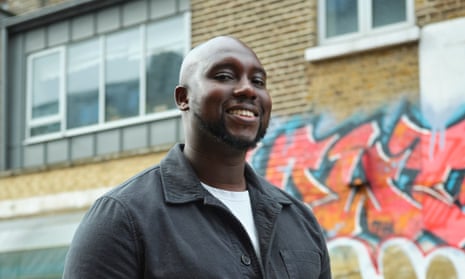My earliest reading memory
Reading Biff and Chip in my first couple of years of primary school. I loved those books and was always desperate for the next one.
My favourite book growing up
Noughts and Crosses by Malorie Blackman. Malorie was my local author – I grew up in Lewisham, south-east London, and she did too – it blew my mind, at 10 or 11, to have someone living near me who was writing fiction in which I could recognise some version of myself.
The book that changed me as a teenager
I have a vivid memory of reading Stoner by John Williams. I don’t remember what first drew me to the novel but I hadn’t read anything like it. The story’s quiet nature pulled me in. The way it renders love in so many different forms was truly inspirational for me both as an artist and a person.
The writer who changed my mind
Reading James Baldwin’s The Fire Next Time in my mid-teens ignited something in me that’s still burning today: a desire to express myself and emotions in a way that’s honest and makes space for exchange. It’s the thing I love about his work: despite its boldness and grandeur, I never feel as if I’m being preached to, only welcomed.
The book that made me want to be a writer
NW by Zadie Smith. It was the first novel of hers I read, in my first year of university. At that point I knew I wanted to write, but reading the novel confirmed it. The language sings on the page and her ear for dialogue is unparalleled. But I also remember thinking, “I know these people”; that her slice of north-west London wasn’t so unlike my corner of the south-east. It was a real moment for me, realising that someone was writing about their community like this, and it emboldened me to try for myself.
The author I came back to
EM Forster’s A Room With a View is one of my favourite books, but when I was younger, I couldn’t get on with Howards End. I revisited it a few years ago after reading Smith’s On Beauty and found I had a greater appreciation of the text.
The book I reread
Jazz by Toni Morrison. It’s one of a few I reread once a year and it always yields new discoveries. I was massively influenced by it when I wrote Small Worlds – not only its writing on music, but also the way in which the narrative meanders and constantly builds on a carefully constructed world.
The book I could never read again
Shoplifting from American Apparel by Tao Lin. I read it at university and revisited it in the pandemic but couldn’t get on with it.
The book I discovered later in life
Maud Martha by Gwendolyn Brooks. I’ve always been a fan of her poetry but this short novel, in which a woman’s life quietly unfolds, is worth close attention.
The book I am currently reading
I’m between a reread of Where We Come From by Aniefiok Ekpoudom – an incredible book charting the social history of rap and grime in the UK – and White Egrets by Derek Walcott.
My comfort read
NW by Zadie Smith or Kumukanda by Kayo Chingonyi. I’ve got editions of both that are falling apart.
